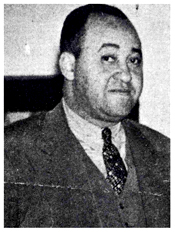

William Augustus Greenlee
Nicknames: Gus, Big Red
Career: 1931-1945
Positions: owner, officer, founder (Negro National League, United States League), president (Negro National League)
Team: Pittsburgh Crawfords
Height: 6' 3'' Weight: 210
Born: 1897, Marion, North Carolina
Died: July 10, 1952, Pittsburgh, Pennsylvania
A businessman, politician, sportsman, and numbers banker, he owned a stable of boxers, including the first black light heavyweight champion, John Henry Lewis, and ran a popular cabaret, the Crawford Grill, but he was best known as the owner of the Pittsburgh Crawfords. Political motivations caused him to buy the Crawfords in 1930 but, once involved, he wanted the best team possible and signed established stars, including Satchel Paige and Josh Gibson.
The Crawfords reached the pinnacle of success during his ownership, and for five years (1932-1936) his team was ranked with the best each season. In 1933, acting as the president of the Negro National League, he awarded his team a contested pennant, but in 1935 the Crawfords defeated the New York Cubans in a playoff for an undisputed championship. This team is considered by most historians to be the greatest black team of all time. The Crawfords won the second half title the following year, but the playoffs were not completed and no 1936 champion was recognized. That season was marred by a scandal when the Crawfords were unjustly accused of throwing a game against the Brooklyn Bushwicks.
A wealthy man who spent his money freely, he was generous with his players and in 1932 built Greenlee Field, the only black-owned ballpark in the East, to be the home field for his team. A combination of losing Paige and Gibson, and having to make a big payoff from a "hit" on a heavily played number, ultimately led to his divesting himself of the team and razing Greenlee Field after the 1938 season.
Although his association with the Negro Leagues was of relatively short duration, his impact was unmistakable. He was the primary force behind the formation of the new Negro National League in 1933 and served as the league's president for its first five years. While at the head of the league, he worked to end rowdyism and assaults on umpires, and opposed raids that decimated his playing personnel. That season he was also responsible for the creation of the East-West All Star game, which became an annual event and which was the most popular and profitable venture in black baseball.
Greenlee was born in a log cabin in North Carolina, but left his home state in 1916 after a year of college to travel North to Pittsburgh, where he worked as a shoeshine boy, steel mill worker, and taxicab driver. After serving overseas in the 367th Army Division during World War I, he began establishing himself as a prominent man in Pittsburgh's black community. During the Prohibition era he operated nightclubs as a front for his numbers operations and bootlegging activities, and the Crawford Grill served as the center of activity for jazz, booze, gambling, and girls. In the 1930s he became a power in Pittsburgh's political arena.
He tried to resume an active role in black baseball in 1945, when he formed the United States League, in conjunction with Branch Rickey's pursuit of a black candidate to integrate organized baseball. The league lasted only two seasons and was never of major-league caliber. After his second exit from the baseball scene, he continued to operate the Crawford Grill until it was destroyed by fire in 1951. For the last year of his life he was besieged by white racketeers encroaching on his numbers business, and by federal government agents harassing him over income taxes he owed.
Source: James A. Riley, The Biographical Encyclopedia of the Negro Baseball Leagues, New York: Carroll & Graf Publishers, Inc., 1994.

William "Gus" Greenlee